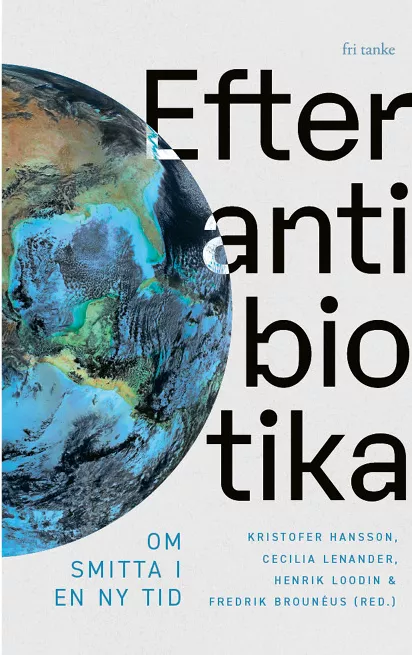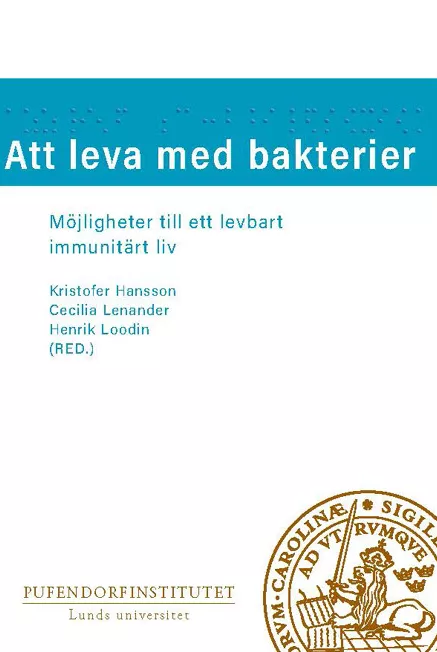Just like the Corona virus, antibiotic-resistant bacteria will have a fundamental impact on our lives. Every year, hundreds of thousands of people around the world die from infections by resistant bacteria. And the problem is growing. Researchers estimate that by 2050 annual mortality rates will have risen to several million.
What will happen when we no longer have effective antibiotics? How will it affect our lives, communities and especially healthcare? Scientists from a number of different fields investigated this for almost two years in a collaboration at the Pufendorf IAS. The work has resulted in two anthologies: Efter antibiotika – om smitta i en ny tid [After antibiotics – on infection in a new age] and Att leva med bakterier – möjligheter till ett levbart immunitärt liv [Living with bacteria – the potential for a viable immune life].
- We want to provide a holistic view of the problem. For example, how does such resistance affect our architecture, culture, communication and healthcare? And conversely, how can we begin right now to adapt these fields to avoid such a dystopian future,’ says Kristofer Hansson, associate professor of ethnology at Malmö University, and one of the scientists in the group.
The books discuss humanity's relationship with antibiotics and bacteria, as well as the historical, social, economic and political dimensions of antibiotics. Together, they show the possible paths to a viable future characterised by a more sustainable relationship with drugs, bacteria and social life.
About the books
Efter antibiotika - om smitta i en ny tid [red. After antibiotics - on infection in a new age]
Resistance to antibiotics causes us concern. This is not at all odd, as every year, hundreds of thousands of people around the world die from infections by resistant bacteria, and the problem is growing. Are we heading for a world without effective antibiotics? What would such a post-antibiotic future mean for mankind?
Efter antibiotika - om smitta i en ny tid is a multidisciplinary anthology in which scientists from different standpoints discuss mankind’s relationship with antibiotics. On the basis of questions that touch upon medicine, politics, culture, communication and architecture, they explore the historical, social, economic and political dimensions of antibiotics. Together, they show the possible paths to a viable future characterised by a more sustainable relationship with drugs, bacteria and social life.
The book is published by Fri Tanke in collaboration with the Pufendorf Institute for Advanced Studies at Lund University, and the non-profit organisation Vetenskap & Allmänhet.
Att leva med bakterier - möjligheter till ett levbart immunitärt liv [red. Living with bacteria - the potential for a viable immune life]
Att leva med bakterier - möjligheter till ett levbart immunitärt liv is a multidisciplinary anthology that examines the importance of growing bacterial antibiotic resistance. This change is rendering antibiotics ineffective and thus reshaping human history over the long term. It is estimated that by 2050, ten million people will die from infections that no longer respond to the antibiotics available today. How can we find alternatives right here, right now to a future that is more viable, with or without effective antibiotics?
The anthology is a result of the multidisciplinary research collaboration conducted in 2019-20 at the Pufendorf Institute for Advanced Studies, Lund University on the Topic of Post-antibiotic futures. In the anthology, ten scientists develop their thoughts and ideas on how today’s and tomorrow’s societies can be shaped to deal with infectious agents such as bacteria and viruses in our everyday lives – infectious agents that may not have a cure in the world of tomorrow.
Press release (in Swedish): Läs hela pressmeddelandet på Vetenskap och Allmänhets hemsida
Op-ed (17th of February, in Swedish): DN Debatt. ”Vi måste förbereda oss för att antibiotika slutar fungera”
Listen to lectures by the scientists
Below you can find lectures and discussions with the scientists and authors of the anthologies during the Lund University Future Week 2020.




